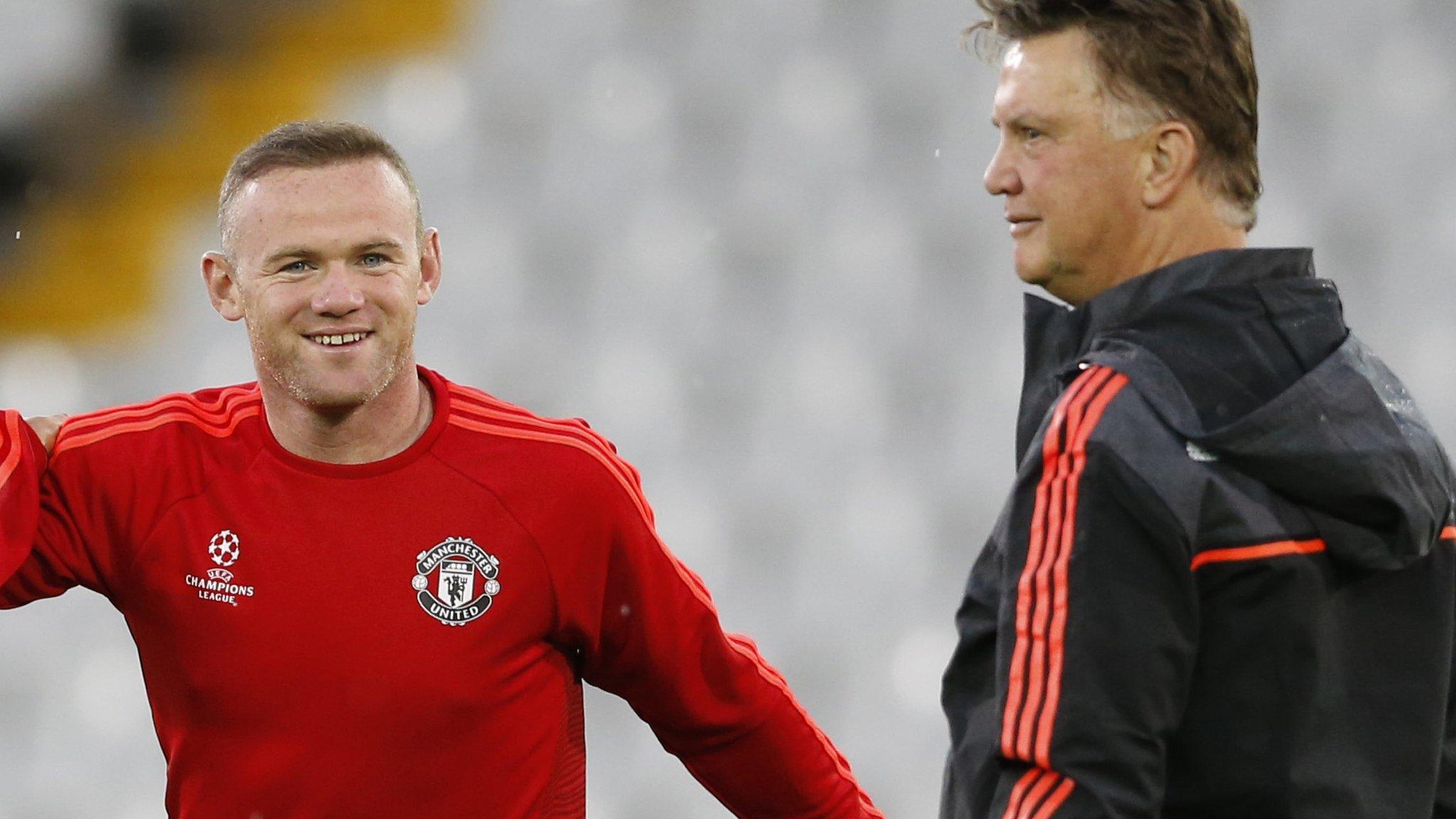Lester Piggott: Jockey on Frankie Dettori, Frankel & fairytales
- Published

Lester Piggott had his first race aged 12 and rode until a few years ago
"How old is he now?" people whisper in passing. The tell-tale lines on his well-weathered face give the game away. He will be 80 this year.
"Of course you never think about going this far," he says. "Nobody really wants to be 80, do they? I suppose it comes to us all."
I'm face-to-face with Lester Piggott, described this week by fellow record-breaking jockey AP McCoy as the "greatest sportsman of all-time". He is partially deaf with a speech defect that gives him a low nasal tone. We are sitting as close as chess players.
As many of Piggott's rivals found during a riding career which made him a household name, things are conducted on his terms. No nonsense. Each word delivered as precisely as one of his 4,493 British winners.
He's smart, slight, sun-kissed. The Swiss air, in which he now resides, is clearly doing him good. Trademark grey suit, polished black loafers.
"I do plenty of exercise. I walk quite a bit, but I haven't ridden in three or four years," he says.
There are no spoken regrets, no plans for a big party to mark his ninth decade - which begins on 5 November - though he "really ought to do something".
Plenty of pauses, but plenty of insight too, if you're patient. In the course of our conversation he says Frankie Dettori is the best, Frankel isn't, current jockeys are better than previous generations, and recalls his own "fairy story" comeback 25 years ago.
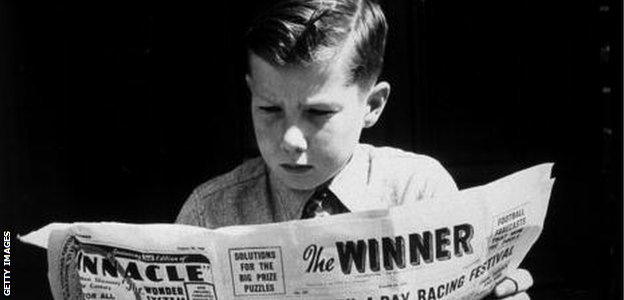
Piggott, aged 12, studies the form in 1948, the year he won his first race
'Better jockeys now... but they should be'
Piggott set new landmarks in a racing career which began at the age of 12 in 1948 and continued into the 1990s, via a spell in prison which made front page news, and two retirements.
He was a master of coaxing half-a-ton of thoroughbred at speeds topping 35mph round Epsom's unique mile-and-a-half rollercoaster track, winning the Derby an unprecedented nine times. That is two more than recent champion jockeys Kieren Fallon, Dettori and Ryan Moore have between them.
All of this on a starvation diet, reputedly majoring in champagne and cigars, and riding at up to a stone-and-a-half below his natural weight. Tall for a flat jockey at nearly 5ft 8in, he weighed as little as 8st 5lb. They called him the Long Fellow.
Lester Piggott in numbers |
|---|
Classic wins: 30 Derby: 9 St Leger: 8 Oaks: 6 2,000 Guineas: 5 1,000 Guineas: 2 Royal Ascot victories: 116 |
Of his 30 Classic victories, eight came in the world's oldest - the St Leger - which will be run again on Saturday at Doncaster. This is where we chat on the lawn on the inside of the track.
For a man regarded by many racing observers as the greatest jockey, some of his comments about the current crop come as a surprise.
"Overall they are better now. They're more stylish," he says.
Pause. Is there a punchline?
"Of course you have to remember they get so much more practice. I'd have maybe 500 rides a year and some of them are getting 1,000. They should be better, by average," he adds.
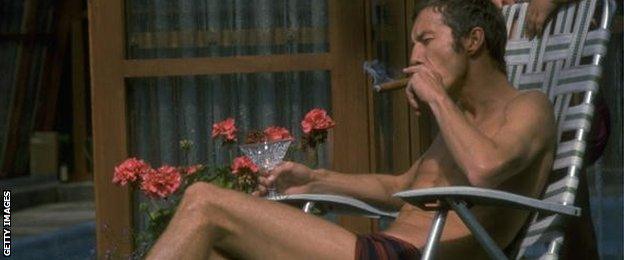
Piggott relaxes with a cigar at home in 1981, one of 11 years in which he finished champion jockey
'Everything changes - it's progress'
Piggott was champion jockey 11 times between 1960 and 1982 in an era where rivals included talented riders like Willie Carson and Pat Eddery.
The format for the championship, which still sees the rider with most victories winning the title, has changed from this year.
Rather than the full term of the British turf flat racing season from mid-March to early November, it now runs from early May to the middle of October.
The move has been branded sacrilege by some traditionalists, but Piggott sees the benefits - meaning top jockeys can still ride in the big autumn races abroad without affecting their domestic title hopes.
"Everything changes, even in everyday life. It's progress. Everything is faster," says Piggott, who will present the trophy to the winning jockey at Ascot on British Champions Day on 17 October.
"I think it's right now because they've got everybody riding and it finishes at a reasonable time.
"There's so many big meetings all over the world that the better jockeys have to go to. The horses they have been riding are running in those big races."
Would Piggott have won more titles under the new system?
"I'd hope so," he replies. And you suspect he knows so.
Piggott on current jockeys |
|---|
On Frankie Dettori - "Frankie really is the best, isn't he?" So what sets him apart - judgement, pace? I ask. "Nobody knows that - if you knew, you could make jockeys." |
On Ryan Moore: "He doesn't say very much, but everybody's different. Frankie does a lot of talking, I suppose, but he's been good for racing. They are two different people." |
On Silvestre de Sousa, the current title favourite who is nearly 30 wins ahead of nearest rival William Buick: "He's got a good lead now and seems unbeatable." |
The greatest horse? Not Frankel
Despite the passage of time, the names of horses he rode many years ago live on in the racing lexicon - Nijinsky, The Minstrel, and his own personal favourite Sir Ivor.
He rode Nijinsky 45 years ago to become the last partnership to win the British Triple Crown - the 2,000 Guineas, Derby and Leger - but the horse does not feature at the top of his best-ever list.
"The greatest horse I've seen is Seabird. I always thought Seabird was the best, then Ribot and then probably Frankel," he says.
He did not ride any of them. Seabird won the Derby and Prix de l'Arc de Triomphe in 1965, Ribot was a two-time Arc winner a decade earlier, while Frankel went 14 races unbeaten before retirement in 2012.
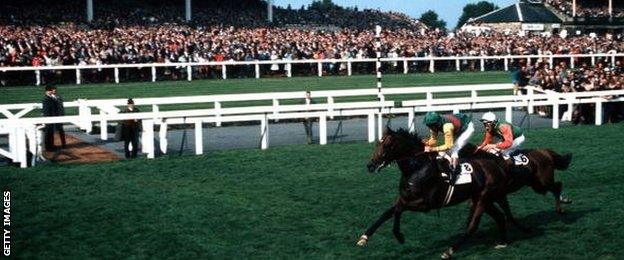
Piggott won the 1970 St Leger on Nijinsky to complete the Triple Crown
The Voice of Racing - 'an exceptional man'
Piggott lost a close friend last month when the former BBC racing commentator Sir Peter O'Sullevan died at the age of 97.
"Sir Peter was part of racing for so long. He was there every day more or less. He became a big friend," recalls the former jockey.
"He was an exceptional man. I used to see him quite a lot right until the end."
O'Sullevan was quoted in one of his last interviews, external as saying he had hinted to the Queen that Piggott might be given his OBE back.
The honour was withdrawn when Piggott was jailed for three years, external in 1987 after being found guilty of an alleged tax fraud of more than £3m. With time off for good behaviour, he served a year and a day in prison.
He dismisses the OBE story as "rubbish", so I ask how he feels about that whole episode now.
"I don't want to talk about that," he says.
Piggott looks into the distance. I'm boxed in and look for an opening. Nowhere to go, until we revisit a great racing tale.
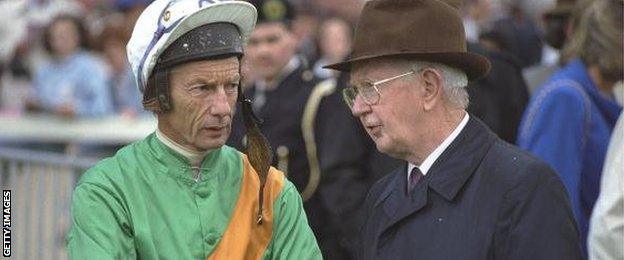
Piggott and trainer Vincent O'Brien were reunited in 1990
Fairytale comeback - at the age of 54
The awkwardness evaporates as I ask about one of Piggott's greatest rides - which featured in a Sunday Times list of the '50 great sporting moments of the 20th Century'.
After a stalled training career and prison, he made a triumphant return to the saddle in 1990 at the age of 54.
Just 12 days out of his second retirement, Piggott guided Royal Academy, trained by old ally Vincent O'Brien, to victory in one of the world's richest races - the $1m Breeders' Cup Mile.
"It was Vincent O'Brien. He made the suggestion really. I wasn't thinking about it. He said 'why not come back?' and I did," he recalls.
The jockey showed all his icy nerve as he waited to pounce, seizing victory in the final strides, prompting the on-course commentator to call him "the living legend".
Recalling the victory at Belmont Park, New York, Piggott said: "He wasn't really a mile horse. I had to ride him to get the trip and had to wait. He was always a little bit slow into his stride.
"It was a good performance that day. He was going very well. I don't know what happened but on the turn for home he slipped. He lost his footing and just stopped for a few strides. To get up and win after that, he had to be a good horse."
You broke into a rare post-race smile, I suggest to him, having watched the footage back.
"It was exceptional really. It was like a fairy story and they don't often happen."
And he smiles again, ending on another victory.
- Published11 September 2015
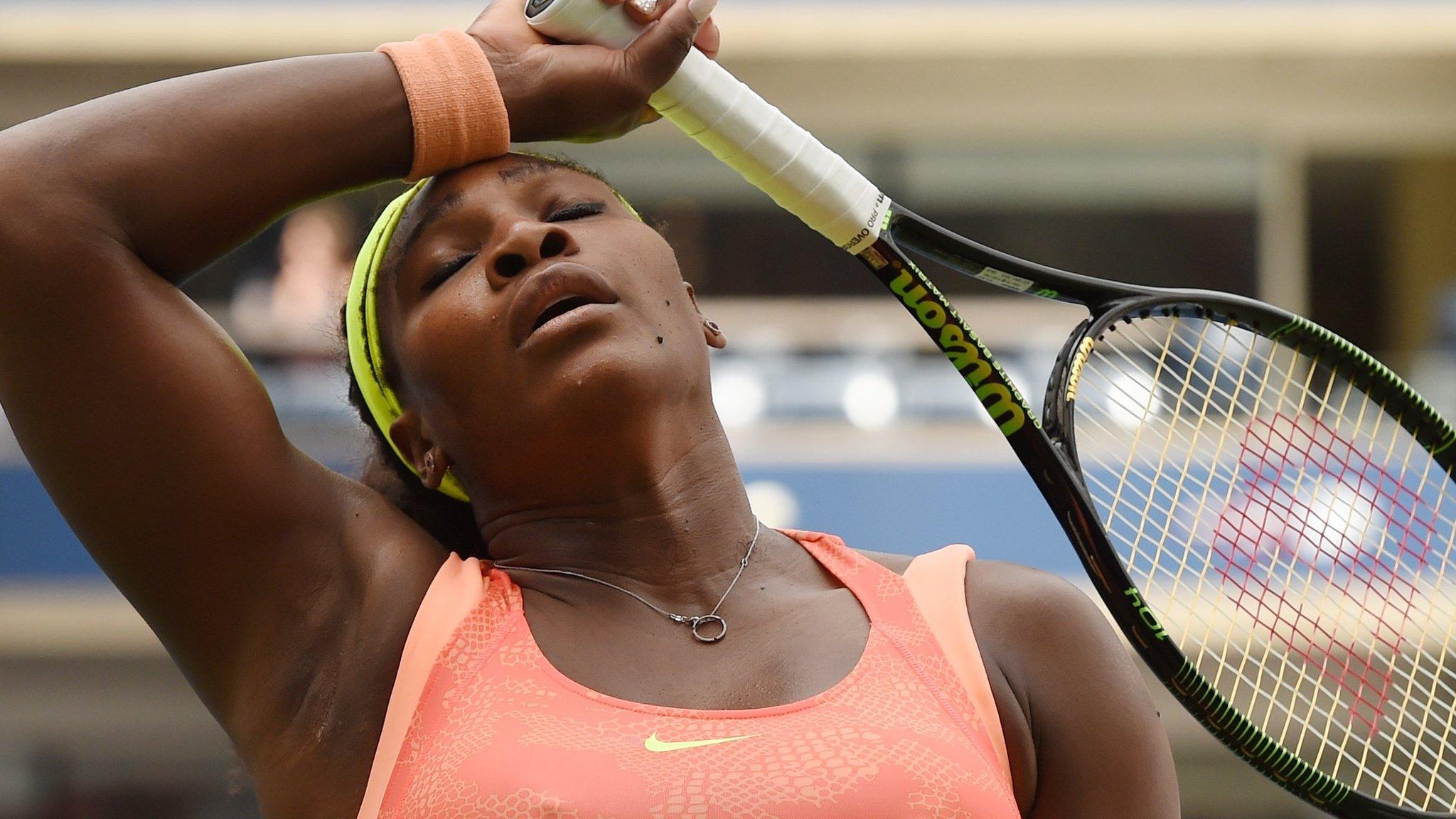
- Published11 September 2015
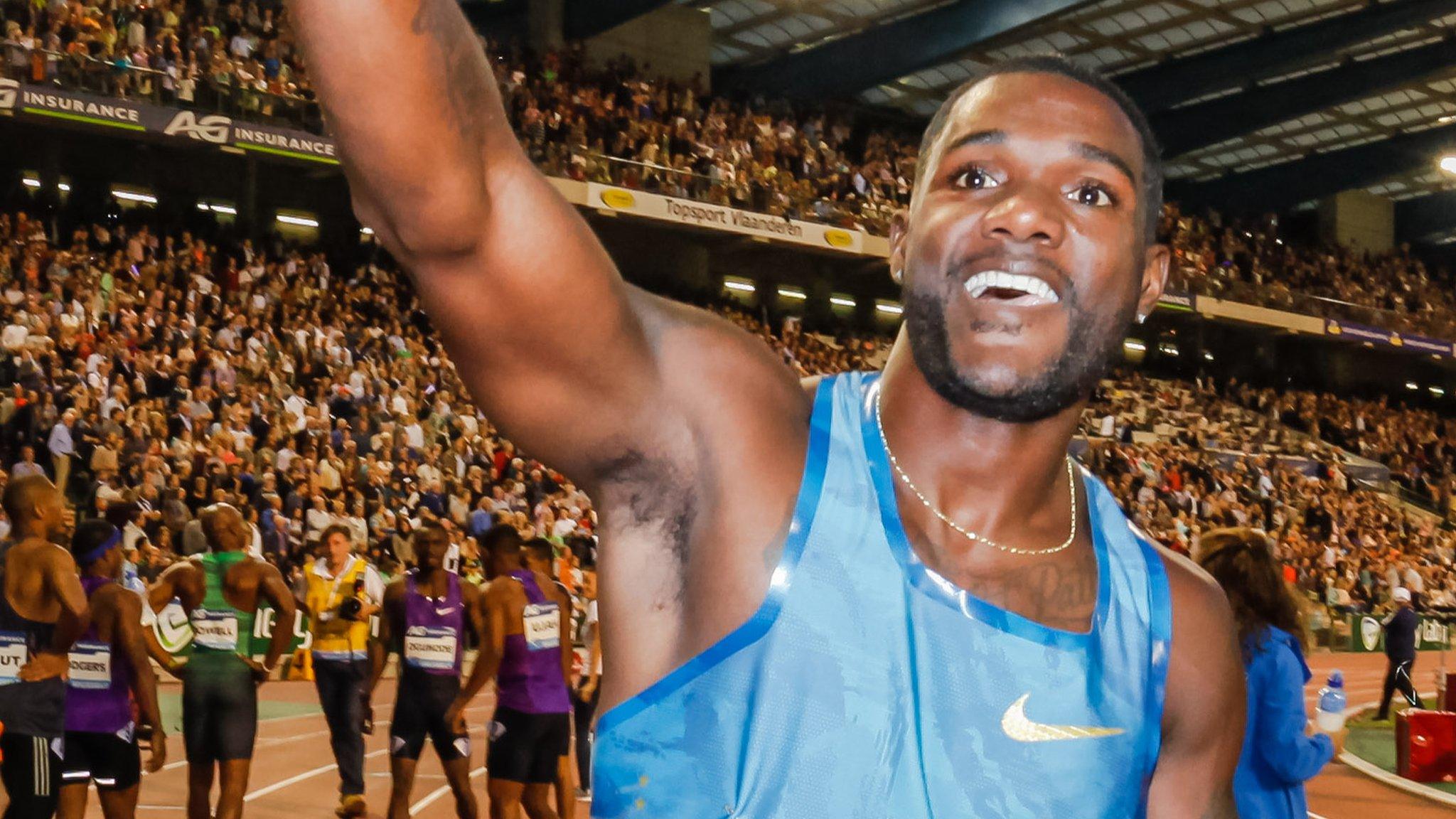
- Published11 September 2015
